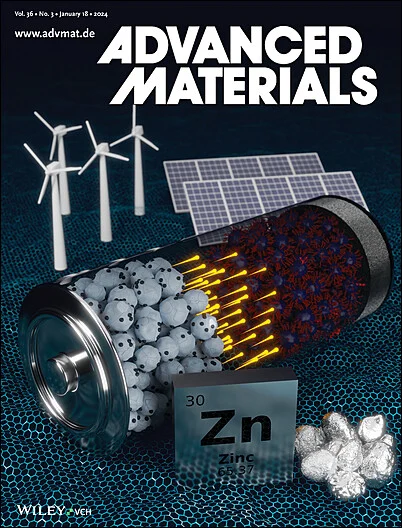金属-有机骨架基质孔隙中的强Lewis酸效应对无枝晶锂沉积和剥离的影响
IF 26.8
1区 材料科学
Q1 CHEMISTRY, MULTIDISCIPLINARY
引用次数: 0
摘要
在锂金属电池(lmb)的三维基质中均匀引入路易斯酸位点对于促进Li+的解离和脱溶至关重要。本文提出使用MIL - 101(一种众所周知的柔性金属有机骨架,负载均匀分布的具有不饱和路易斯酸位点的AlFx物种)作为Li -金属阳极(LMA) 3D宿主,以促进Li+在lmb中的解离和脱溶。使用AlFx@MIL‐101/Cu和预沉积锂(Li@AlFx@MIL‐101/Cu)的对称电池表现出超过3600小时的稳定性能。此外,高负载LFP||Li@AlFx@MIL‐101/Cu满电池在1℃下4000次循环后保持高容量,平均库仑效率为99.87%。实验和理论分析表明,具有强Lewis酸性的AlFx和具有纳米空间约束效应的MIL - 101促进了Li+的解离和脱溶,并伴有Li+快速均匀的输运。MIL - 101孔隙可容纳Li物种,从而抑制LMA的体积变化。这些结果表明AlFx@MIL‐101保证了Li在lma上均匀且无枝晶的沉积,使其成为高稳定性lmb的有希望的宿主。本文章由计算机程序翻译,如有差异,请以英文原文为准。
Strong Lewis Acid Effect in the Pores of Metal–Organic Framework Host for Dendrite‐Free Lithium Deposition and Stripping
The homogeneous introduction of Lewis acid sites into 3D hosts of Li‐metal batteries (LMBs) is crucial for promoting Li+ dissociation and desolvation. Herein, the use of MIL‐101, a well‐known flexible metal–organic framework, loaded with uniformly distributed AlFx species with unsaturated Lewis acid sites, is proposed as a Li‐metal anode (LMA) 3D host to promote Li+ dissociation and desolvation in LMBs. A symmetrical cell using an AlFx @MIL‐101/Cu with pre‐deposited lithium (Li@AlFx @MIL‐101/Cu) exhibits stable performance for over 3600 h. In addition, a high‐loading LFP||Li@AlFx @MIL‐101/Cu full cell maintains high capacity after 4000 cycles at 1 C with an average coulombic efficiency of 99.87%. Experimental and theoretical analyses reveal that the AlFx species with strong Lewis acidity and MIL‐101 with nanospace confinement effect promote Li+ dissociation and desolvation coupled with fast and uniform Li+ transport. The MIL‐101 pores accommodate Li species, thereby inhibiting volume changes in the LMA. These results demonstrate that AlFx @MIL‐101 ensures uniform and dendrite‐free Li deposition on LMAs, making it a promising host for high‐stability LMBs.
求助全文
通过发布文献求助,成功后即可免费获取论文全文。
去求助
来源期刊

Advanced Materials
工程技术-材料科学:综合
CiteScore
43.00
自引率
4.10%
发文量
2182
审稿时长
2 months
期刊介绍:
Advanced Materials, one of the world's most prestigious journals and the foundation of the Advanced portfolio, is the home of choice for best-in-class materials science for more than 30 years. Following this fast-growing and interdisciplinary field, we are considering and publishing the most important discoveries on any and all materials from materials scientists, chemists, physicists, engineers as well as health and life scientists and bringing you the latest results and trends in modern materials-related research every week.
 求助内容:
求助内容: 应助结果提醒方式:
应助结果提醒方式:


